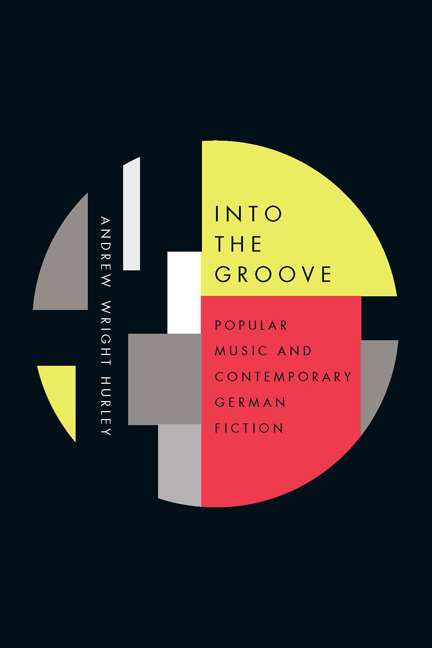Book contents
- Frontmatter
- Dedication
- Contents
- Acknowledgments
- Introduction
- 1 Preludes and Returns: Popular Music, the ʿ68 Generation, and the Literarization of the Jukebox
- 2 Enter the Double Agent: The German Popular Musician as Novelist
- 3 Techno-Lit: Electronica and Its Impacts on Fiction
- 4 Analogue is Better: Rock- and Pop-centric Literature
- 5 After the GDR's “Musical Niche Society”? Popular Music in the Literature of Thomas Brussig
- 6 The Gendering of Popular Music in the Novels of Karen Duve and Kerstin Grether
- Conclusion: Out of the Groove?
- Bibliography
- Index
5 - After the GDR's “Musical Niche Society”? Popular Music in the Literature of Thomas Brussig
Published online by Cambridge University Press: 05 May 2015
- Frontmatter
- Dedication
- Contents
- Acknowledgments
- Introduction
- 1 Preludes and Returns: Popular Music, the ʿ68 Generation, and the Literarization of the Jukebox
- 2 Enter the Double Agent: The German Popular Musician as Novelist
- 3 Techno-Lit: Electronica and Its Impacts on Fiction
- 4 Analogue is Better: Rock- and Pop-centric Literature
- 5 After the GDR's “Musical Niche Society”? Popular Music in the Literature of Thomas Brussig
- 6 The Gendering of Popular Music in the Novels of Karen Duve and Kerstin Grether
- Conclusion: Out of the Groove?
- Bibliography
- Index
Summary
[Im Osten] wurde und wird in Musik ein Lebensphilosophie hineinprojiziert, wo der Westler schlicht Unterhaltung erkennt.
[In the East a philosophy of life was and is projected into music, whereas the Westerner simply sees entertainment.]
—Christoph Dieckmann, My GenerationThomas brussig (born 1965 in East Berlin) was an enthusiast of Nick Hornby's 1995 novel High Fidelity and of Frank Goosen's similarly musico-centric Liegen lernen (2001). His own musico-centrism, although long-standing, began to fully emerge in his 1999 screenplay and novelization of the Leander Haussmann film Am kürzeren Ende der Sonnenallee (At the shorter end of Sonnenallee). Popular music, and its complexion in and after the GDR, would continue to be of thematic interest to Brussig, especially over the next five years—in the 2000 play Heimsuchung (Visitation) as well as in the 2004 novel Wie es leuchtet (How It Shines). These texts represent a reckoning with the special history of popular music production and consumption in the GDR and contribute to our understanding of the social meanings attached to popular music after the state's demise. More specifically, they demonstrate the ambiguous political potential of popular music in and after state socialism. The special history of the GDR made the production and consumption of popular music a political act, at least for some. This chapter will use the film and novelization of Sonnenallee to explore how popular music's antiregime connotations could operate during the life of the GDR and how some former easterners would choose to remember those connotations in the 1990s and beyond. I will use Wie es leuchtet to show how, in the revolutionary period of 1989–90, popular music could support a social movement. Yet the novel indicates how fragile such a nexus might be, and how the political associations that many East Germans made with popular music quickly dissipated, contributing to the sense of disorientation they felt after the Wall fell. This literary image is consonant with the fundamental point established by the secondary literature about popular music and politics.
- Type
- Chapter
- Information
- Into the Groove?Popular Music and Contemporary German Fiction, pp. 159 - 192Publisher: Boydell & BrewerPrint publication year: 2015



